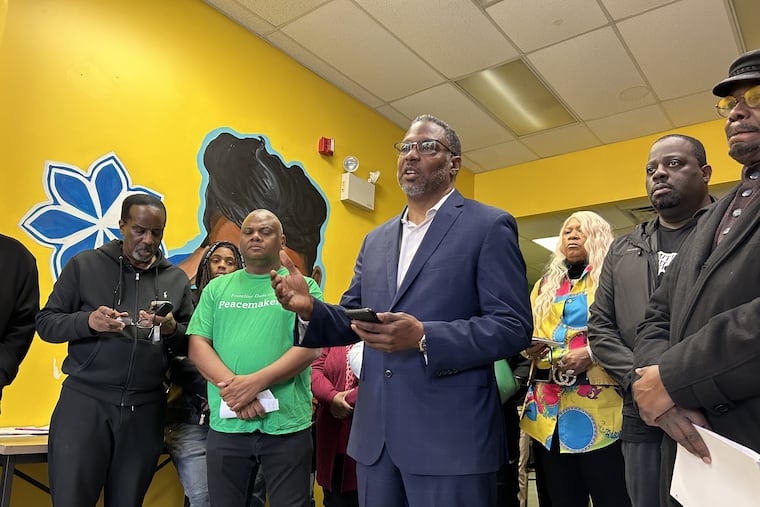A group of Black community advocates criticized a recent Inquirer investigation as racist and harmful
Advocates said the story perpetuated unfair stereotypes. The Inquirer's editor said "the goal here was to bring a serious issue to light, and the story has done that.”

A group of prominent Black community advocates gathered Monday to criticize a recent Inquirer investigation into how the city awarded millions in anti-violence grants as racist and harmful, calling it an unfair portrayal of the difficult work advocates have long been performing in communities suffering from high rates of gunfire.
Speaking at a news conference in North Philadelphia, Reuben Jones, executive director of the nonprofit Frontline Dads, said the story — which found that a city-run grant program had invested in some community nonprofits without budgets, employees, or directors — perpetuated racist stereotypes, including the notion that Black people from poor neighborhoods can’t be trusted to responsibly manage taxpayer money.
Standing before a group of about two dozen other advocates, Jones said: “These are the community members that represent healing … in the community that you don’t respect, that you don’t value, that you don’t trust.”
The Rev. Gregory Holston, a senior adviser in the District Attorney’s Office who also works with an advocacy group called the 57+ Blocks Coalition, said Black communities for decades have suffered from a deliberate lack of investment and services, “and now we have one program that comes forward to actually help these organizations be able to have the resources they need, and now that program is under attack as well.”
Several speakers said The Inquirer should retract the article and apologize. Rickey Duncan, the CEO of the NoMo Foundation — which received a $1 million grant — called the story an “injustice” and said: “They owe us, and everybody in our community that we serve, a public apology.”
Gabriel Escobar, The Inquirer’s editor and senior vice president, said in a statement: “I understand why community members who are trying their best to address a crisis are angry and upset. But the goal here was to bring a serious issue to light, and the story has done that.”
He added: “Our story, based on interviews and public records, looked at how tax dollars are being spent to address an epidemic of gun violence afflicting Philadelphia. It identified serious issues with the way grants were awarded and monitored by the city, even as it noted that some of the community-based organizations were not only doing well with the money but also making a difference.”
The story, published online last week, examined how the city’s Community Expansion Grant (CEG) program, launched in 2021, distributed $13.5 million to 31 organizations in an attempt to address record levels of gun violence. It quoted city officials highlighting the impact the grants had on more than 4,500 teens and young people, and provided several examples of groups that used the funding to bolster their capacity and impact.
But the story — citing financial records, interviews, and internal communications involving city administrators — also uncovered a politicized selection process that left millions of dollars unspent and tens of thousands unaccounted for. It quoted experts critiquing how the city set the program up, and found some groups that received funding had subsequently abandoned major components of their proposed programs.
(The Inquirer began looking into the CEG program as a whole after reporters found that $80,000 from a youth boxing program had been improperly paid to police officers or their children. The city suspended its funding.)
Speakers at Monday’s news conference defended the work that many grassroots organizations do, saying many have provided services for years without any outside funding or recognition. They said advocates frequently have to adjust tactics or spending to respond to the needs of participants, many of whom are difficult to reach — and that their groups should not be criticized for having to change course.
Holston was among the speakers who said the city needs to distribute more funding to grassroots organizations led by Black men and women. He added that critical reporting could make that more difficult to achieve.
“Do not bash the city for actually doing what we asked: To be creative and take a risk in the middle of an emergency. That’s what they’re supposed to do,” Holston said. “When you bash them like that, we can’t get them to do that again.”
The city does plan to move ahead with a new round of grants this year. Escobar, The Inquirer’s editor, said: “More money is being distributed in the near future, and making sure that it is spent effectively and efficiently is in the public interest given the unrelenting violence.”